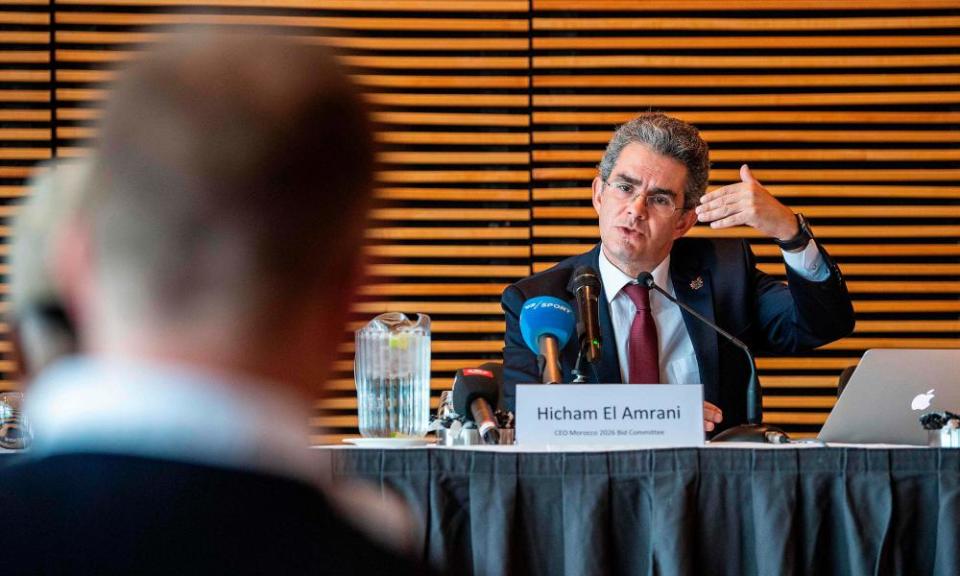After months of mystery, Morocco finally unveils bid for 2026 World Cup

In a high-end restaurant overlooking the Atlantic ocean from the port city of Tangier, the Morocco 2026 bid chief executive presented his vision for a World Cup that for so long remained shrouded in mystery. It entered the two-horse race last August, running against a supremely confident and organised joint campaign from the US, Canada and Mexico.
For the first five months it was a virtual information blackout but now that Hicham El Amrani and his team have started talking, murmurs are the contest will be closer than expected. After apparent last-minute goalpost moving by Fifa in an attempt insiders suspect was designed to derail Morocco’s bid, simply making it to the vote in Moscow on 13 June would be an achievement.
The Guardian understands Morocco 2026 submitted a complaint to Fifa last month concerning the eligibility of four of the Fifa member federations to vote. As bidding nations, Morocco, the US, Canada and Mexico must abstain from voting but the US territories of Guam, Puerto Rico, American Samoa and the US Virgin Islands have retained votes.
The Moroccan bid is based on a concept of Africa meets Europe, with 12 host cities and a stadium construction budget of $3bn. The plan is to build nine stadiums, of which six are modular allowing their capacity to be reduced after the tournament.Extensive renovations will be made to five existing stadiums. El Amrani and his team hope they can persuade the 207 remaining Fifa voting-member federations that Morocco, which has bid for the World Cup four times before, is now capable of hosting the biggest sporting event on the African continent.
It is widely understood the Fifa hierarchy – including the president, Gianni Infantino – would prefer the united bid, with its ready-made stadiums, infrastructure and accommodation provisions. That is not to mention a guaranteed $300m bonus payment due the governing body if the tournament is held in the US.
It is also understood that three Fifa Council members – Sunil Gulati from the US, the Concacaf vice‑president Victor Montagliani, and Sandra Fruean of American Samoa – have remained in meetings where they should have excused themselves.
There was believed to have been disquiet in the Morocco camp, too, about changes to the bid regulations 48 hours before final versions were due to be submitted in March.
The revised rules stated host cities must have a population of 250,000 or more – the Moroccan city of Ouarzazate falls short. A change that particularly raised eyebrows was the maximum drive between a host city and the nearest airport being reduced to 90 minutes – the journey between El Jadida on Morocco’s west coast to Casablanca airport had been estimated at 91 minutes.
A 0-5 judging scale was introduced and if a bidding nation falls short of two points on a key criteria it will be excluded from the race. Morocco has been visited twice by Fifa’s bid inspection taskforce and will find out at the end of this month whether it has passed that test sufficiently to make it to the vote.
“We were a bit surprised of getting the scoring system 48 hours before the deadline, which was not necessarily about methodology but about additional information required,” El Amrani said.
It was also surprised to see the US president, Donald Trump, getting involved in the race when Fifa rules outlaw political interference. Trump tweeted: “The US has put together a STRONG bid w/ Canada & Mexico for the 2026 World Cup. It would be a shame if countries that we always support were to lobby against the US bid. Why should we be supporting these countries when they don’t support us (including at the United Nations)?”
The South Africa sports minister, Tokozile Xasa, also said this week that her country would not be supporting the Moroccan bid.
El Amrani said: “My focus is on defending the values of the Moroccan bid, its values, its concept. But in relation to political interference, I think the rules are pretty clear. Fifa has to implement them. The bidders have to respect them.”
Asked if he thought the bid process had been fair, El Amrani said: “I will be able to tell you that at the end of May and then maybe on 13 June. All we wish for is a good game.”
Fifa did not respond to an approach for comment.
Martha Kelner’s trip to Morocco was paid for by the Morocco 2026 bid team

 Yahoo Sport
Yahoo Sport 





































